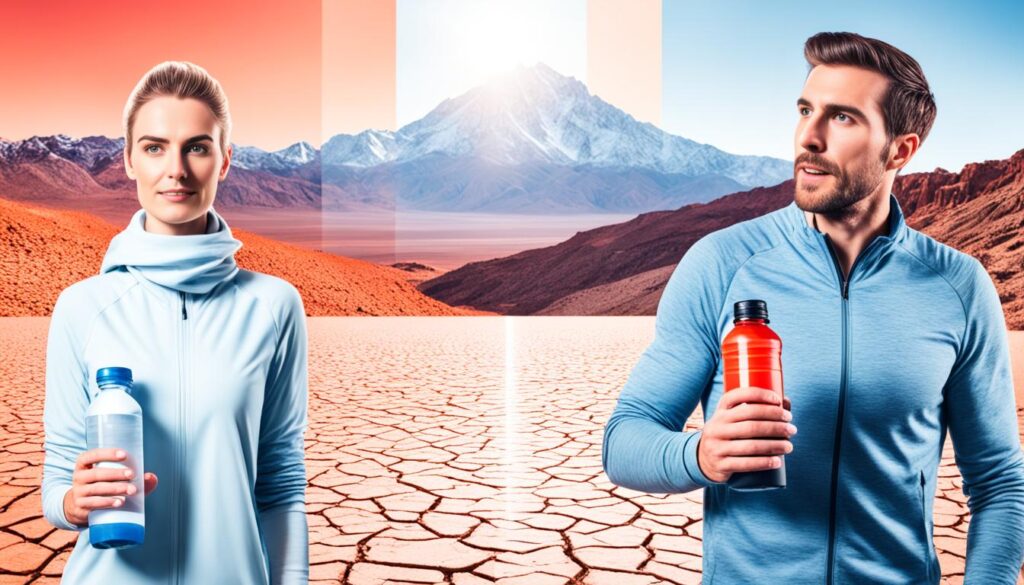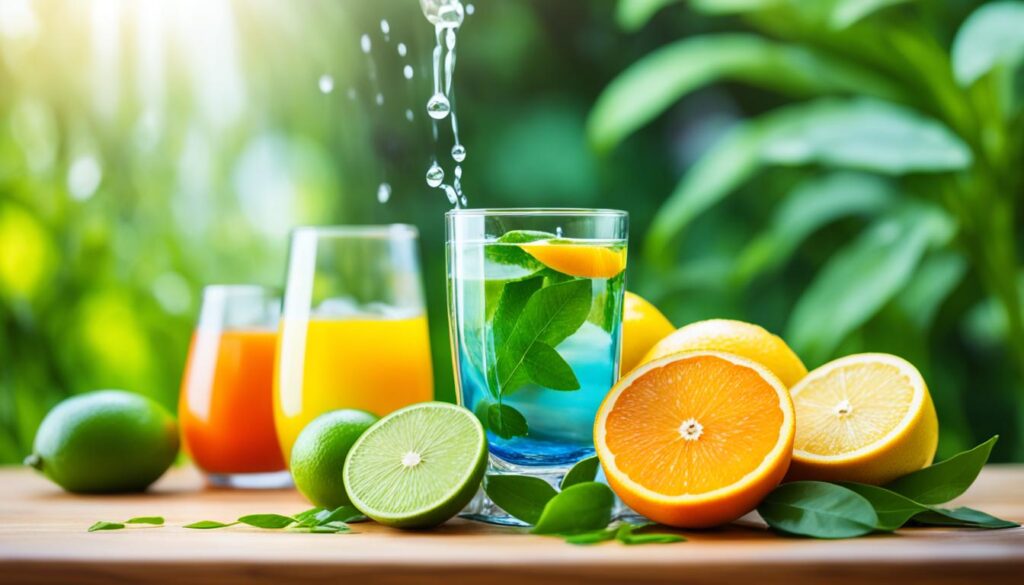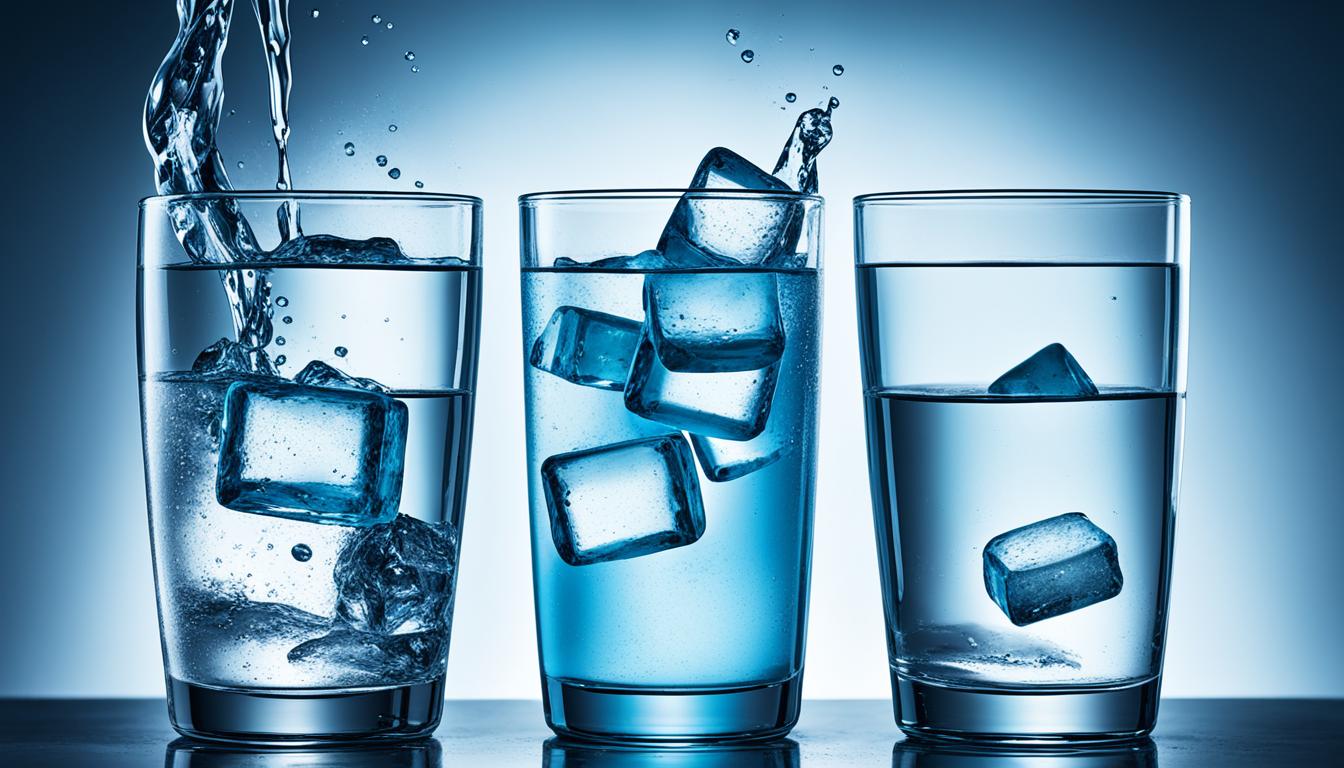People often wonder if hot or cold water is better for the body when fasting. Many think warm water helps with digestion and detox. Yet, others say cold water can kickstart the metabolism and help lose weight. No matter the choice, keeping hydrated is key to staying healthy during a fast.
Water is critical for health. It brings oxygen and nutrients to cells and helps with blood flow. It also aids in digestion and protects organs from harm. During a fast where you sometimes don’t eat for 12 to 16 hours or fast for a whole day, it’s vital to drink water. This is because water doesn’t impact blood sugar or insulin.1
Our bodies are mostly water, about 60 to 70 percent. So, staying hydrated is very important. A person needs about 10 to 12 cups of water a day during fasting. But, the big question is still there: should you pick hot or cold water for fasting?
Key Takeaways
- Staying hydrated is crucial during water fasting, regardless of water temperature preference.
- Warm water may aid in digestion and detoxification, while cold water can potentially boost metabolism and support weight loss.
- Drinking water does not affect blood sugar or insulin levels during intermittent fasting.
- The human body is composed of 60 to 70 percent water, highlighting the importance of proper hydration.
- When fasting, the body’s water needs can be met by consuming 10 to 12 cups of water per day.
The Importance of Staying Hydrated During Water Fasting
Many people now turn to water fasting. It’s for detoxing and losing weight. This fasting style means not eating for specific periods. This could be from 12 to 16 hours a day, or 24 hours once or twice a week1. But, it’s key to keep drinking enough water. This helps the body do its job well during fasting.

How Water Supports Bodily Functions
Water is crucial for our body’s work. It keeps our temperature in check and moves nutrients around. It also takes out waste and helps our joints. When fasting, the body uses its own energy. For this, it needs water to stay strong. Under normal circumstances, adults need about 2 liters of water daily2. If we don’t drink enough, we can get dehydrated. This leads to issues like headaches, tiredness, and trouble focusing2.
The Recommended Daily Water Intake
So, how much should we drink during fasting? The advice is simple. Have a glass of water at different times, up to 8 glasses a day2. But remember, don’t drink too much at once. More than 250 – 300 mL in a glass can stop our body from taking it all in2.
Besides water, there are other drinks good for fasting. These include black coffee, unsweetened tea, flavored water, and sparkling water1. Bone broth, if your fast allows it, can be a smart pick too1. Yet, avoid things like soda, sweet tea, and drinks with sugar or calories. Also, stay away from coffee with milk or sugar, energy drinks, smoothies, milk, and alcohol while you fast1.
| Recommended Beverages During Water Fasting | Beverages to Avoid During Water Fasting |
|---|---|
| Plain water | Soda |
| Black coffee | Sweet tea |
| Unsweetened tea | Sports drinks |
| Flavored water | Coffee with milk or sugar |
| Sparkling water | Energy drinks |
| Bone broth (depending on fasting regimen) | Smoothies |
| Milk | |
| Alcohol |
Keeping hydrated during fasting helps our body work well. It stops dehydration and lets us get the most from our fast.
Benefits and Risks of Drinking Cold Water During Fasting
Drinking water while fasting is affected by its temperature. Cold water can boost your metabolism and lower your body temperature. It can even help prevent overheating during exercise3. But remember, just drinking water of any temperature can lower how many calories you eat all day3.
Potential Benefits of Cold Water
When you drink cold water, your body uses energy to warm it up. This process can help you burn more calories, which is good for those doing intermittent fasting3. This fasting method involves eating during certain hours and not eating for the rest of the day or several times a week1. For these fasting periods, you can also choose from calorie-free drinks like black coffee, unsweetened tea, flavored water, and lemon water1.
Risks Associated with Drinking Cold Water
While cold water has its benefits, it may not help with digestion. A cold drink can slow down the digestion process and cause some issues. This includes bloating, indigestion, and even making migraines worse for those who get them43.
Some research from 2001 found that cold water could trigger migraines for some people3. Drinking 16 degrees Celsius water can stop sweating quickly, but it also thickens mucus in your nose. This can make breathing difficult, showing that cold water might not be so good after all43.
| Potential Benefits of Cold Water | Risks Associated with Drinking Cold Water |
|---|---|
| May help burn a few extra calories during digestion | Can slow down digestion and lead to digestive issues |
| Can lower body temperature and fight fever | May trigger migraines in some individuals |
| May enhance workout performance and prevent overheating | Could make nasal mucous thicker and harder to pass |
While cold water has its pluses, it also has downsides. It’s vital to be aware of the effects on digestion and comfort. During fasting, drinking 10 to 12 cups of water a day is important4. It’s best if this water is lukewarm to avoid digestive distress4.
Advantages of Consuming Warm Water While Fasting

Drinking warm water while fasting has many health perks. It’s great for your digestion and detoxing your body. Ayurveda and Chinese medicine say a glass of warm water in the morning boosts digestion vastly5. It wakes up your gut, getting more blood moving and helping keep indigestion and constipation at bay5.
Warm water also serves a big detox role. It clears out toxins, which can stop health issues like acne. During a water fast, when you don’t eat for 12 to 24 hours, drinking warm water helps purify your gut. Plus, it jumpstarts your liver and stomach, making the whole digestive system perk up5.
There’s also the added bonus of less pain. Warm water gets blood flowing, easing things like cramps, headaches, and sore muscles. This extra circulation speeds up healing and calms down swelling.
But, there’s a trick to the warmth of the water. While warm is good, make sure it’s not too hot. Lukewarm is best, especially in the morning, to keep your hunger in check5. Very hot water isn’t safe during fasting. It could even hurt your digestion5.
“Consuming hot water with honey multiple times in the morning hours of fasting is a traditional Ayurvedic weight loss method, helping to keep hunger under check and providing nourishment during fasting.”5
To wrap it up, adding warm water can really boost your fasting. It’s good for your gut, helps detox, and keeps your blood flowing well. By taking advice from ancient healing methods and being in tune with your body, you make the most out of your fast. This supports your overall health too.
Hot or Cold Water for Water Fasting: What’s the Ideal Choice?
People often wonder about the best water for fasting: hot or cold? The answer depends on what feels right to you. Cold water can be super refreshing, especially in warm times or after a workout. Yet, warm water might be better for you, helping your digestion and flushing out toxins6.
Factors to Consider When Choosing Water Temperature
Choosing the right water temperature for fasting involves several aspects. Cold tap water is usually about 60°F (15.55°C), while room temperature water hits about 78°F (25.55°C)6. Athletes usually go for the cold because it’s known to quench thirst more effectively6. On the flip side, hot drinks might actually be better for some people dealing with achalasia, a rare disorder impacting 1 in 100,000 Americans each year6.
If you’re into intermittent fasting, where you eat within a certain window, water is key. It’s perfect because it has no calories and is quite healthy17. Aside from water, go for calorie-free picks like black coffee, unsweetened tea, flavored water, and sparkling water17.
The Best Times to Drink Cold or Warm Water During Fasting
Experts say go for cold water when you need to cool down your body. This is great after working out, on hot days, or when you’re sick6. Interestingly, just the act of drinking ice water burns calories because your body has to heat it6.
But warm water is perfect in the mornings. It can get your metabolism going, so you burn calories better throughout the day. Drinking warm liquids at meals keeps your digestive system smooth. Keep in mind, though, there’s no big health difference between warm and cold water; it’s more about what you like6.
| Fasting Type | Recommended Drinks | Drinks to Avoid |
|---|---|---|
| Intermittent Fasting (12-16 hours daily or 24 hours once or twice a week) | Water, black coffee, unsweetened tea, flavored water, sparkling water | Drinks with calories or sugar (sodas, sweet tea, sports drinks, coffee with milk or sugar, energy drinks, smoothies, milk, alcohol) |
| 5:2 Fasting (Eat normally for 5 days, restrict calories to 500-600 for 2 days) | Water, low-calorie drinks like coffee, tea, lemon water, sugar-free electrolyte drinks | Caloric drinks, smoothies, bone and vegetable broths |
| 16:8 Intermittent Fasting (Fast for 16 hours, feed for 8 hours) | Water, sparkling and seltzer waters with no artificial sweeteners | Drinks that break the fast (coffee with cream, milk, or butter) |
Conclusion
The best water temperature for fasting is what you like most and what’s good for your health. Some people enjoy the refreshment of cold water. Others may find warm water more calming. But, the real secret to successful fasting is keeping yourself hydrated. Our bodies are mostly water. So, drinking enough water is key to staying healthy4.
Remember, the water’s temperature doesn’t change its health benefits. Cold or warm, water can help detox the body and aid digestion. But, be smart about how much and when you drink. Too much water at once doesn’t help much. Plus, it can make you thirsty quickly and mess up your sleep. Try to sip on 10 to 12 cups of water each day. This helps you stay fit, boost your immunity, and not get dehydrated while fasting4.
The most important part of water fasting is to stay active and drink plenty of water. Choose fresh, clean water over sweet drinks or canned juices. This way, you get the most out of your fast. You might prefer cold water to cool down on hot days or after working out8. Or you might like warm water to get your digestion going, help your blood flow, and make your circulation better8. When to drink water and what’s best for you, it’s all up to you. By keeping an eye on how your body feels and making sure you drink enough water, you can make the most of fasting. It can lead to great well-being and energy levels.
Source Links
- https://www.healthline.com/nutrition/can-you-drink-water-when-fasting
- https://pkgm.fk.ugm.ac.id/en/2022/04/12/stay-hydrated-during-ramadan/
- https://www.healthline.com/health/is-drinking-cold-water-bad-for-you
- https://www.omanobserver.om/article/1118010/oman/health/cold-or-hot-water-after-fasting
- https://www.easyayurveda.com/2011/10/28/how-to-do-water-fasting-benefits-of-water-fasting-to-lose-weight/
- https://health.clevelandclinic.org/cold-water-vs-warm-water
- https://www.mindbodygreen.com/articles/what-can-you-drink-while-fasting
- https://customwater.com/cold-water-vs-warm-water/




